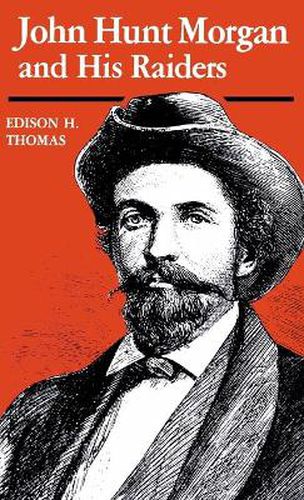Readings Newsletter
Become a Readings Member to make your shopping experience even easier.
Sign in or sign up for free!
You’re not far away from qualifying for FREE standard shipping within Australia
You’ve qualified for FREE standard shipping within Australia
The cart is loading…






Whether one things of him as dashing cavalier or shameless horse thief, it is impossible not to regard John Hunt Morgan as a fascinating figure of the Civil War. He collected his Raiders at first from the prominent families of Kentucky, though later the exploits of the group were to attract a less elite class of recruits. Morgan was able to lead these men into the most dangerous adventures by convincing them that the honor of the South was at stake; yet he did not always succeed in appealing to that sense of honor when temptations of easy theft drew the Raiders from military objectives to wanton pillage. In John Hunt Morgan and his Raiders, Edison H. Thomas gives us a balanced view of these controversial men and their raids. In a fast-paced narrative he follows the cavalry unit for the evening the first group set out from Lexington to join the Confederate forces until the morning of Morgan’s death in Greeneville, Tennessee. Basil Duke, St. Leger Grenfell, Lightning Ellsworth, and the beautiful Martha Ready all receive their due, and the truly remarkable story of the Raiders’ newspaper is told. A special contribution is the insight this account offers into the disruption of rail communications carried out with such enthusiasm by Morgan and his men. Thomas’ study of the railroad records of the period has enabled him to present this part of the Raiders’ story with rare detail and understanding.
$9.00 standard shipping within Australia
FREE standard shipping within Australia for orders over $100.00
Express & International shipping calculated at checkout
Stock availability can be subject to change without notice. We recommend calling the shop or contacting our online team to check availability of low stock items. Please see our Shopping Online page for more details.
Whether one things of him as dashing cavalier or shameless horse thief, it is impossible not to regard John Hunt Morgan as a fascinating figure of the Civil War. He collected his Raiders at first from the prominent families of Kentucky, though later the exploits of the group were to attract a less elite class of recruits. Morgan was able to lead these men into the most dangerous adventures by convincing them that the honor of the South was at stake; yet he did not always succeed in appealing to that sense of honor when temptations of easy theft drew the Raiders from military objectives to wanton pillage. In John Hunt Morgan and his Raiders, Edison H. Thomas gives us a balanced view of these controversial men and their raids. In a fast-paced narrative he follows the cavalry unit for the evening the first group set out from Lexington to join the Confederate forces until the morning of Morgan’s death in Greeneville, Tennessee. Basil Duke, St. Leger Grenfell, Lightning Ellsworth, and the beautiful Martha Ready all receive their due, and the truly remarkable story of the Raiders’ newspaper is told. A special contribution is the insight this account offers into the disruption of rail communications carried out with such enthusiasm by Morgan and his men. Thomas’ study of the railroad records of the period has enabled him to present this part of the Raiders’ story with rare detail and understanding.